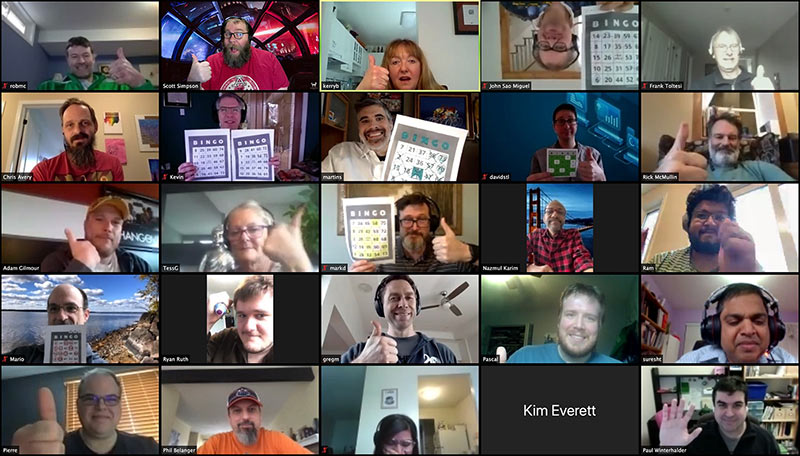‘We built the business from the basement up.’
It’s a pretty common start-up story, especially in the software world. But what isn’t quite so common is keeping a software business surviving and even thriving for more than two and a half decades.
BitHeads is an Ottawa, Canada-based software development company that has accomplished just that.
Since getting its start back in 1995, the business has grown to over 75 employees plus contractors and serves more than 500 customers.
No doubt, it has seen the industry advance in countless ways. But bitHeads’ key to keeping its competitive edge in this fast-paced environment has been two-pronged.
- It has pivoted its business model in a meaningful way to meet the changing demands of the market, as well as to cater to the burgeoning gaming industry.
- But it has also stayed true to its highly skilled and customized approach to software development.
“The biggest change for us has been the offshoring of software development and the commoditization of it,” says Paul Winterhalder, Vice President, Chief Development Officer and one of the ‘Head Bits’ at bitHeads.

“Over the years, tons of competitors have come up. They’re frequently offshore and super cheap. But building a custom product for someone is an exercise in communication and understanding of their requirements. And that is really hard to do with an overseas team in different time zones.”
Winterhalder and his team take a more hands-on approach and consider themselves craftsmen in the development space.
Since its humble beginnings, bitHeads has worked on many different applications, including everything from software-based private branch exchanges (PBXes) and point-of-sale systems, to mobile/console video games and even full online casino platforms.
But a big transformation for the business came from seeing a commonality in the different projects it was doing in terms of the technologies for the backend of the systems.
We like to joke that it only took us 17 years to realize we were building the same thing over and over again on the back end and to finally productize that,” says Winterhalder. “And that’s what we ended up doing.”
The move to backend SaaS
About 8 years ago, bitHeads began developing a product called brainCloud. It’s a feature-rich, highly scalable backend for the development of games, apps, and other systems.
The company now focuses on two divisions:
- its custom software development—which is the roots of the business, and
- backend as a service (BaaS)—the company’s evolution into the software as a service (SaaS) space.
While brainCloud serves as the basis of its BaaS offering, it’s a strong competitive advantage for bitHeads in more ways than one.

As a differentiator from its offshore competitors, the bitHead team has its brainCloud product as a starting point that enables it to deliver projects faster for customers. It’s also easy for outside developers to build upon with apps and it can cut off years of development time in building a solution, says Winterhalder.
At the same time, the product is available for licensing to private customers.
We have some big companies that need that sort of backend, but they want to own all the data,” he says. “They want to make sure everything’s being hosted in their cloud, and that’s where brainCloud comes in.”
Serving subscription SaaS and BaaS solutions for the gaming world
While brainCloud now weaves through almost everything bitHeads does as a business, the business’s BaaS service offering has quickly become its main focus. And in fact, bitHeads was one of the first companies to offer successful game-oriented BaaS.
BrainCloud can be used across all industry verticals, but it has a specialized feature set for gaming and it’s more aimed to that particular market, says Winterhalder.
We get everything from indie developers to midsize studios who are using our public BaaS. Then we get billion-dollar game publishers who license our backend for private instances.”
BitHeads’ client base is dominated by developers who want to focus on the experience they’re providing for their games, he says. They don’t want to focus on things like account management, in-app purchases, push notifications, multiplayer, and leaderboards. They want to provide those features, but they also want to avoid the custom engineering they require.
“That’s what we provide,” says Winterhalder. “Games built on top of brainCloud can work across iOS and Android, web, desktop, and consoles.”
And demand for the product is showing no signs of slowing down. There was even a dramatic uptick in its growth trajectory since the start of the COVID-19 pandemic. More people at home means more people spending time gaming, which of course means more games are being developed.
“The usage of our system has doubled since March 2020,” says Winterhalder.
The roadblock to scaling its BaaS service
Deciding to target the gaming industry with it’s brainCloud BaaS service was clearly a smart move made by the company. The gaming market is booming and some even consider it the fastest growing industry on the planet.
The global gaming industry is worth about $164.6B in 2020. That figure is expected to climb to $196B by 2022.
However, during its initial pivot toward prioritizing its brainCloud product, the bitHeads team quickly realized it had a bit of a roadblock. It was the early days of gaming back-ends and like many others in the space at that time, the business had its service up and running before it had a scalable way of billing for it.
In fact, there was about a six-month period when brainCloud first launched that you could sign up for it before the business would be able to start billing you for it, says Winterhalder.
BitHeads started looking for solutions, but because its pricing system is complicated, finding the right solution was complicated as well.
“Our system is what you call elastic,” says Winterhalder. “The more of our services you use, the more we charge you. There’s a complicated formula of API counts, the amount of data you’ve downloaded, server hours if we host servers for you, and what have you.”
In addition to the billing, the bitHeads team was also concerned about the security issues involved with having to keep track of customer credit cards for ongoing payments.
“We just basically needed a flexible, convenient, and secure way for folks to pay,” says Winterhalder. “We wanted to hook it up and not have to worry about it. But at the time, I don’t think we realized just how much flexibility we would need.”

A flexible recurring billing solution to simplify complex pricing options
BitHeads chose Stax Bill as its recurring billing software provider early in 2015.
“It’s definitely a good match for us,” says Winterhalder. “Stax Bill provides us with a customizable, feature-rich, subscription system that handles all the complexities of monthly credit-card billing in a secure way. We don’t have to worry about those details.”
And what about the business’s complex pricing system?
BitHeads has about seven public plans as well as a few private plans for certain customers. Each plan also has seven or eight different variables in terms of calculating the pricing. Some of the pricing is flat, while some is tiered.
The business was able to get up and running with its Stax Bill solution before any customers on its BaaS service model went live.
This negated the need for the business to do any sort of manual or make-shift billing, which would have been a job in itself, says Winterhalder.
BitHeads sends its raw data counts to the Stax Bill platform, he says. All the pricing for everything is set up in its catalog and the system automatically calculates pricing in a very custom way on a monthly basis and charges customers accordingly.
“We lucked out that Stax Bill is able to handle this sort of thing because we didn’t know what we didn’t know when we first started down this path,” says Winterhalder. The system takes care of our security concerns, but it’s also flexible enough to handle the way we do our usage based billing at the end of the month.”
Optimizing SaaS revenue collections and analysis
Like most subscription-based businesses, every month bitHeads experiences its share of failed payments from its global customer base.
While these outstanding payments are rarely substantial—in fact they’re usually for hundreds of dollars each, or less—that revenue adds up over time.
Stax Bill’s automated dunning management features take care of collecting on those failed payments without the bitHeads team having to get involved. Ultimately, automated collections accounts for about 5-10% of company’s monthly revenue.
“I’m sure you would just write it off otherwise,” says Winterhalder.
The ability to report by plan and by product is another useful feature of the Stax Bill platform for bitHeads. Because the business has a wide selection of products and plans within its catalog, this functionality provides clarity on the revenue the business is netting for each of its offerings. It also differentiates the revenue between products and plans.
That separation between those two is great and very useful to us. It really helps us to better understand how we’re pricing the system and what it is people are paying for. It also helps to track down errors.”
For example, bitHeads offers hosting as a product. So if the team sees it’s getting a certain amount of revenue from its hosting product and then compares it to its Amazon hosting server costs, they should match up.
If they don’t, the team can look into it further.
Keeping talented developers focused on core business objectives
An often unanticipated benefit of automating a SaaS business’s recurring billing is the ability to keep skilled developers working on product advancement rather than on billing and customer management.
“I’ve got developers working to build new features and what have you. And as we play with our different pricing models and add different plans and everything over time, I’m able to do that independently without bothering those engineers,” says Winterhalder.
This lends itself to a quick go-to-market advantage.
The ability to create customized new plans, to migrate old plans to new ones, and to have a fully functioning self-service portal available out of the box without requiring input from the development team is definitely beneficial, he says.
Empowering monetization at the feature level
“As you’re trying to monetize your service, it’s going to evolve over time. Having a tool that does all that as opposed to having to build that into your product itself is great. Your product is trying to evolve your feature set, not the monetization of that, so it’s nice to be able to separate those two.”
Winterhalder compares what Stax Bill has been able to offer his business to what his business provides to its top customer base.
It’s kind of like Stax Bill is our backend,” he says.
“We don’t have to worry about things in the same way that we’re the backend for our game developer so that they don’t have to worry about things. We’re free to worry about the features our customers need and not worry about how we charge them. And that’s fantastic for us.”









